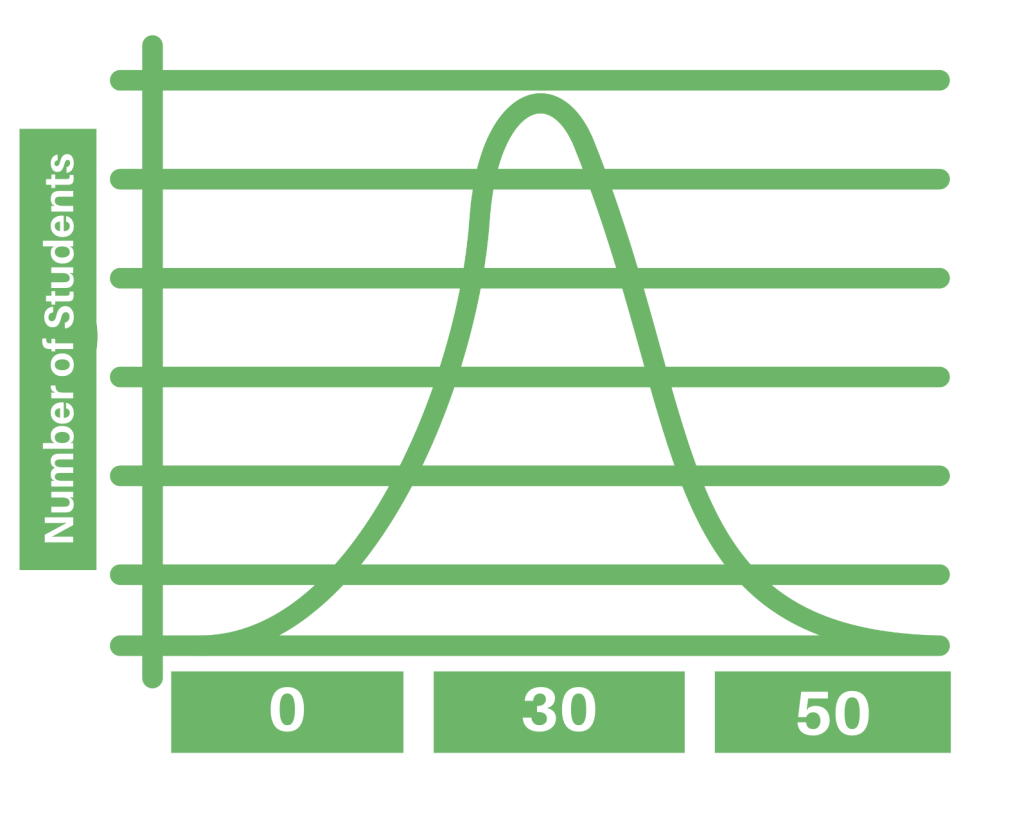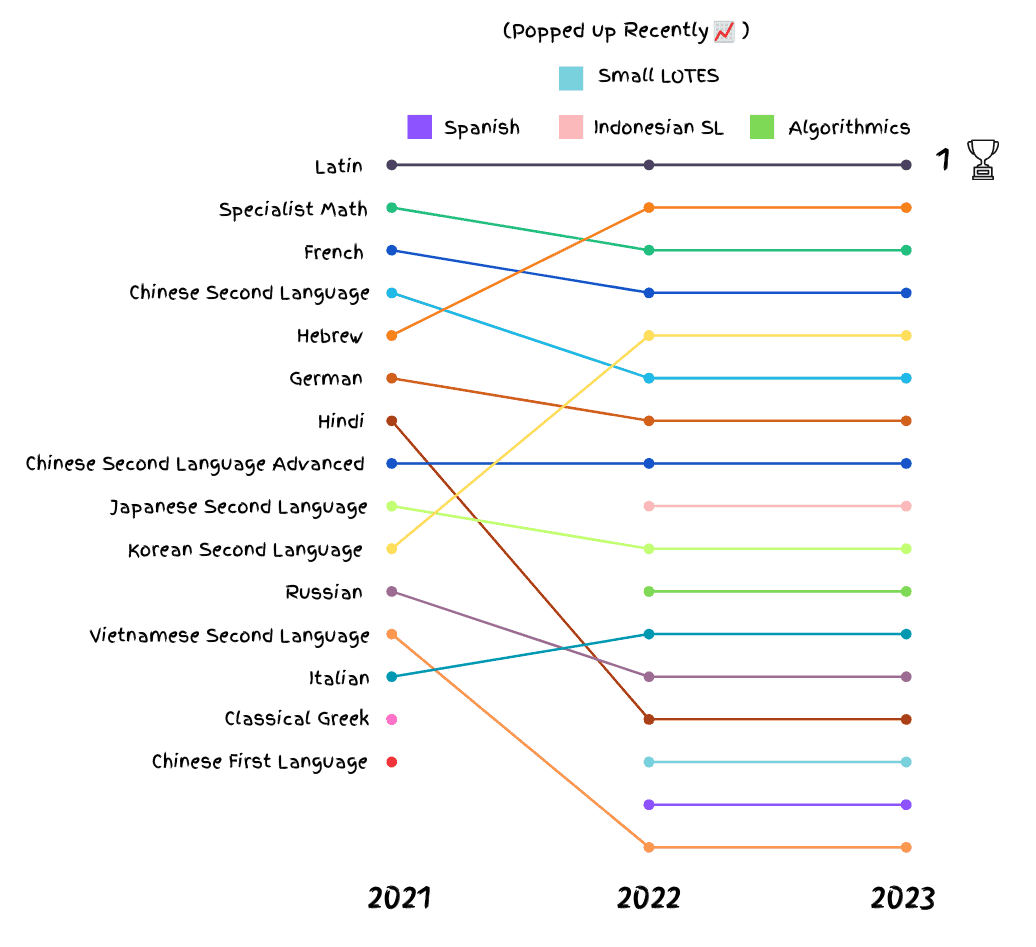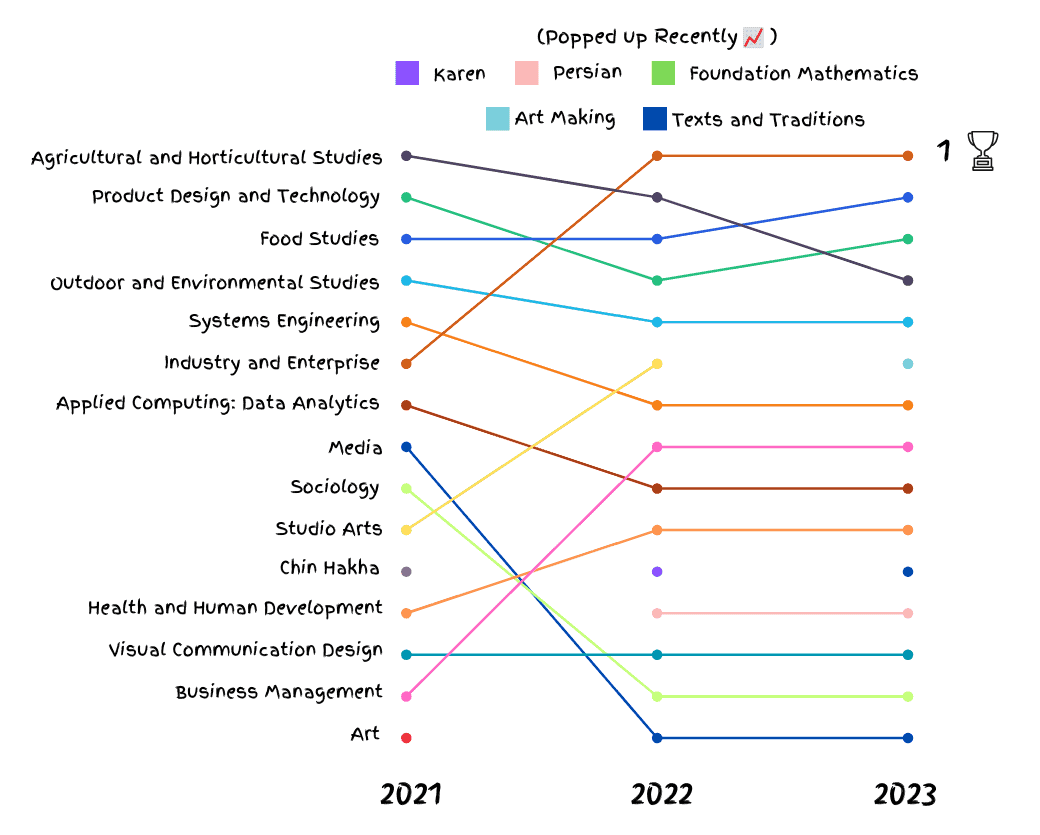Curious about the VCE scaling report and how it influences your study scores? Wondering how it can affect your subject scores and ATAR? Then you have come to the right place!
Be aware: subject scaling is used to equalise subject results, and shouldn’t be used to make subject choices. It changes year-to-year based on the performance of the cohort completing the unit.
There are many more salient factors to consider when choosing your VCE subjects.
We’ll guide you through it all, so what are you waiting for? Let’s get started!
Why Does Scaling Matter?
What is a VCE Study Score?
How Does the Subject Scaling Report Work?
VCE Scaling Report for 2021
VCE Scaling Report for 2022
VCE Scaling Report for 2023
Why You Shouldn’t Worry about Scaling
How Should You Choose Your Subjects?
Why Does Scaling Matter?
Scaling matters because it gives every Year 12 student a fair and equitable shot.
We should clear one important thing up: how your subject scales does not make or break your ATAR.
There are many misconceptions about VCE scaling — and, for good reason, it’s pretty complicated!
Let’s deconstruct VCE scaling into the simplest terms.
What is Scaling?
Scaling is really just a rank of a subject’s difficulty and competition.
This rank isn’t how “hard” the subject is. Rather, it’s the level of competition to achieve a high mark in that subject, as well the overall performance of the subject’s students.
The more competition the subject has, the higher the study score scales upwards.
For example, there is much more competition in Latin because it’s extremely difficult to get a high mark!
If less Year 12 students are getting a raw study score of 30 in Specialist Math (the second best scaling subject in 2021!) than in Business Management, this means Specialist Math is the more competitive subject.
With this logic, getting one of the top spots for Business Management would be roughly the same as the top 10% for Specialist Math.
Why Compare the Subjects?
It can be confusing why VCAA has to rank and compare the subjects’ difficulty when all the subjects’ content is vastly different from one another.
For VCAA to give every student an accurate ATAR (or, standardise your marks), they must put all study scores for all subjects on the same scale — this is when scaling becomes necessary!
Why Do We Need to Scale?
At first, scaling seems unfair — you could be putting in the same hours of studying in Specialist Mathematics as you do in Business Management.
But, the purpose of scaling is so that VCAA can accurately and equitably calculate your performance compared to the rest of the Year 12 cohort in Victoria!
VCAA uses a lot of data and statistics to determine how raw study scores should be scaled down or up.
Once you have a sum of all your marks and aggregates, everything is much simpler for uni applications. Instead of punching in your study stores, you only have to provide your ATAR!
What is a VCE Study Score?
Your “raw” study score is a ranking of how well you performed in a certain subject. The scale goes from 0-50, with a mean of 30.
The easiest way to understand what your study score is by visualising a bell curve:
Students with a raw study score of 30 will sit on the centre of the bell curve — this is where the majority of Year 12 students will sit on a subject.
Learn more about study scores in our article about SAC Rankings and how they affect your ATAR!
How Much Will My Study Score Get Affected by Scaling?
Your study score will get most affected by scaling the closer you are to the centre of the bell curve.
Conversely, if you have one of the top or bottom study scores in a subject, your study score will get less affected by scaling.
Making the step up from Year 11 to Year 12? Here’s how to ace it…
How Does the VCE Scaling Report Work?
After you complete Units 3 & 4 of a VCE subject, you will receive a subject score.
These scores indicate your performance relative to the cohort of students attempting the units. A subject score of 30 places you right in the middle of the cohort, while a subject score of 45 means that you’ve outperformed 98% of the cohort!
These subject scores do not account for the fact that certain units attract better performing cohorts. For example, only being in the top 50% of Specialist Maths students still makes you pretty smart!
To account for this, these subject scores are scaled by the other subjects scores that the cohort achieves, which helps us get a better idea of how difficult the competition is in each subject.
Also looking for tips on acing your VCE SACs? We’ve got you covered!
Which VCE Subjects Scale Up The Most?
See how the best scaling subjects have changed over the years!
Which VCE Subjects Scale Down the Most?
See how the worst scaling subjects have changed over the years!
VCE Scaling Report for 2021
The information in this section is from VCAA’s 2021 VCE Scaling Report.
Scaling changes from year to year, so it’s important to keep updated with the reports. Some subjects might remain in their rank, but others will move up or down ranks!
Top VCE Scaling Subjects for 2021
| Rank | Subject | 30 Scaled to |
|---|---|---|
| 1 | Latin | 46 |
| 2 | Specialist Mathematics | 42 |
| 3 | French | 41 |
| 4 | Chinese Second Language | 41 |
| 5 | Hebrew | 41 |
| 6 | German | 39 |
| 7 | Hindi | 38 |
| 8 | Chinese Second Language Advanced | 38 |
| 9 | Japanese Second Language | 38 |
| 10 | Korean Second Language | 37 |
| 11 | Russian | 37 |
| 12 | Vietnamese Second Language | 36 |
| 13 | Italian | 36 |
| 14 | Classical Greek | 36 |
| 15 | Chinese First Language | 36 |
It is important to note that languages always tend to scale the most. Specialist Math is the exception, and always seems to be up there also!
Worst Scaling Subjects for VCE 2021
| Rank | Subject | 30 Scaled to |
|---|---|---|
| 1 | Agricultural & Horticultural Studies | 23 |
| 2 | Product Design and Technology | 23 |
| 3 | Food Studies | 23 |
| 4 | Outdoor and Environmental Studies | 24 |
| 5 | Systems Engineering | 24 |
| 6 | Industry and Enterprise | 24 |
| 7 | Applied Computing: Data Analytics | 25 |
| 8 | Media | 25 |
| 9 | Sociology | 25 |
| 10 | Studio Arts | 25 |
| 11 | Chin Hakha | 26 |
| 12 | Health and Human Development | 26 |
| 13 | Visual Communication Design | 26 |
| 14 | Business Management | 26 |
| 15 | Art | 26 |
If your goal was to get an 99.95 ATAR with these subjects, this would mean you’d need to be one of the top study scores for each subject.
This ensures that your raw study score would get least affected by the scaling of the subjects!
VCE Scaling Report for 2022
This section provides information from VCAA’s 2022 VCE Scaling Report.
Top VCE Scaling Subjects for 2022
| Rank | Subject | 30 Scaled to |
|---|---|---|
| 1 | Latin | 46 |
| 2 | Hebrew | 45 |
| 3 | Specialist Mathematics | 42 |
| 4 | French | 41 |
| 5 | Korean Second Language | 40 |
| 6 | Chinese Second Language | 40 |
| 7 | German | 39 |
| 8 | Chinese Second Language Advanced | 38 |
| 9 | Indonesian Second Language | 38 |
| 10 | Japanese Second Language | 38 |
| 11 | Algorithmics | 37 |
| 12 | Italian | 37 |
| 13 | Russian | 36 |
| 14 | Hindi | 35 |
| 15 | Small LOTES | 35 |
| 16 | Spanish | 35 |
| 17 | Vietnamese Second Language | 35 |
Here are the changes from 2021’s best scaling subjects:
- Hebrew scales up by 15 instead of 11
- Korean Second Language scales up by 11 instead of 7
- Small LOTES, Spanish, Indonesian Second Language and Algorithmics enter the table
- Chinese First Language and Classical Greek both fall out of the table
Worst Scaling Subjects for VCE 2022
| Rank | Subject | 30 Scaled to |
|---|---|---|
| 1 | Industry and Enterprise | 22 |
| 2 | Agricultural & Horticultural Studies | 23 |
| 3 | Food Studies | 23 |
| 4 | Product Design and Technology | 23 |
| 5 | Outdoor and Environmental Studies | 24 |
| 6 | Studio Arts | 25 |
| 7 | Systems Engineering | 25 |
| 8 | Business Management | 26 |
| 9 | Data Analytics | 26 |
| 10 | Health and Human Development | 26 |
| 11 | Karen | 26 |
| 12 | Persian | 26 |
| 13 | Visual Communication Design | 26 |
| 14 | Sociology | 26 |
| 15 | Media | 26 |
Below are the changes from 2021’s worst scaling subjects:
- Industry and Enterprise scales down by 8 instead of 6, becoming the worst scaling subject.
- Karen and Persian enter the table.
- Art and Chin Hakha leave the table.
VCE Scaling Report for 2023
All the data has been extracted from VCAA’s 2023 VCE Scaling Report.
Top VCE Scaling Subjects for 2023
| Rank | Subject | 30 Scaled to |
|---|---|---|
| 1 | Latin | 46 |
| 2 | Hebrew | 45 |
| 3 | Specialist Mathematics | 42 |
| 4 | French | 41 |
| 5 | Korean Second Language | 40 |
| 6 | Chinese Second Language | 40 |
| 7 | German | 39 |
| 8 | Chinese Second Language Advanced | 38 |
| 9 | Indonesian Second Language | 38 |
| 10 | Japanese Second Language | 38 |
| 11 | Algorithmics | 37 |
| 12 | Italian | 37 |
| 13 | Russian | 36 |
| 14 | Hindi | 35 |
| 15 | Small LOTES | 35 |
| 16 | Spanish | 35 |
| 17 | Vietnamese Second Language | 35 |
- There have been no changes in the top 15 Scaling subjects between 2022 and 2023!
Worst Scaling Subjects for VCE 2023
| Rank | Subject | 30 Scaled to |
|---|---|---|
| 1 | Industry and Enterprise | 21 |
| 2 | Food Studies | 23 |
| 3 | Product Design and Technology | 23 |
| 4 | Agricultural & Horticultural Studies | 24 |
| 5 | Foundation Mathematics | 24 |
| 6 | Outdoor and Environmental Studies | 24 |
| 7 | Art Making | 25 |
| 8 | Systems Engineering | 25 |
| 9 | Business Management | 26 |
| 10 | Data Analytics | 26 |
| 11 | Health and Human Development | 26 |
| 12 | Texts and Traditions | 26 |
| 13 | Persian | 26 |
| 14 | Visual Communication Design | 26 |
| 15 | Sociology | 26 |
| 16 | Media | 26 |
The bottom 15 has changed in the following ways from 2022:
- Foundation Mathematics, Art Making and Texts and Traditions enter the bottom 15 after being introduced to the VCE curriculum.
- Karen and Studio Arts have exited the table.
What’s the Key Takeaway?
Subject scaling was unpredictable in the past, due to drastic curriculum adjustments that were required during the COVID-19 pandemic. However, we are seeing the scaling of subjects begin to stabilise and only change when a subject is added or removed.
Additionally, choosing subjects from the top 15 won’t guarantee a top ATAR. If you’re not a Latin enthusiast, then don’t take it!
Tip: If you have zero knowledge and zero interest in learning a specific language subject, it’s not a great idea to take it — instead, take a subject you’ll enjoy spending time on, even when it stresses you out.
Why You Shouldn’t Worry about Scaling
You can probably tell by now that choosing your subjects based on scaling is a bad idea. Year to year scaling can change significantly based on the performance of different cohorts of students.
While there are some subjects which generally have high scaling, these also tend to be difficult subjects such as Latin and Specialist Maths.
Remember that in each subject you are competing with the other students: so choosing a higher scaling subject also means stiffer competition, which may in fact hurt your ATAR.
The only surefire way to get a great ATAR is to choose subjects that you are passionate and skilled in! Remember that a 45 in Theatre Studies scales to 45!
Completing a VCE subject is a lot of hard work, forcing yourself through a subject you aren’t talented at or passionate about is only going to cause burnout.
Remember, there are a lot of tertiary options after school, and a high ATAR isn’t the only way to get into your dream field of work! Check out all of the tertiary study options here!
How Should You Choose Your Subjects?
With scaling out of the way, you may be wondering: how do I choose my VCE subjects?
The best advice to take is to follow the three questions: what do I enjoy, what am I good at, and what is useful. Be aware that you must choose at least one English subject: either English, English Literature or English Language.
Check out the VCE English Study Design guide we’ve created!
What Do I Enjoy?
This should be the most obvious: VCE is arduous, choosing a subject that you are passionate about will improve your motivation and hopefully allows you to even enjoy your VCE.
Since you’ll probably be doing 5 Unit 3 and 4 sequences, make sure to choose at least one subject purely out of passion, as the 5th subject contributes significantly less to your overall ATAR.
What Am I Good At?
Once again this should be pretty straightforward.
Achieving a strong ATAR result relies on strong academic performance, so choosing subjects you can perform in is important.
Make sure that you’re not choosing subjects just based on scaling though, as these subjects also have stronger competition.
What is Useful?
Here’s the point where you really get to think about your future:
- What kind of career do I want?
- What skills will I need for that career? For University?
- Which subjects can broaden my horizons and make me a more well rounded person?
These are all important questions to ask when choosing a subject.
And that’s it — preparing for your VCE Subjects has never been easier!
Check out more of our VCE resources here:
- How to Write a VCE Argument Analysis for English
- The Ultimate Guide to Studying for Your VCE External Exams Over Your Holiday
- The Definitive Guide to Understanding VCE English SAC Text Responses
- How to Ace Your End of Year VCE English Exams
- How to Ace Your End of Year Exams for VCE Business Management
- Everything You Need to Know from the VCE Psychology Study Design
- Everything You Need to Know About Writing a VCE Text Response
Are you looking for some extra help with choosing and studying for your VCE subjects?
We have an incredible team of VCE tutors and mentors (who can provide tutoring in Melbourne)!
We can help you master your VCE subject study designs and ace your upcoming VCE assessments with personalised lessons conducted one-on-one in your home or online!
Looking for VCE Maths tutoring? Get booked in today with one of our Melbourne Math expert tutors!
Still concerned about how tutoring will affect your ATAR outcome? Why not check with one of our expert tutors! We offer VCE tutors in Glen Waverley!
We’ve supported over 8,000 students over the last 11 years, and on average our students score mark improvements of over 20%!
To find out more and get started with an inspirational VCE tutor and mentor, get in touch today or give us a ring on 1300 267 888!
Scott McColl is a content writer with Art of Smart and a Civil Engineering student at Monash University. In between working and studying, Scott enjoys playing music and working on programming projects.







